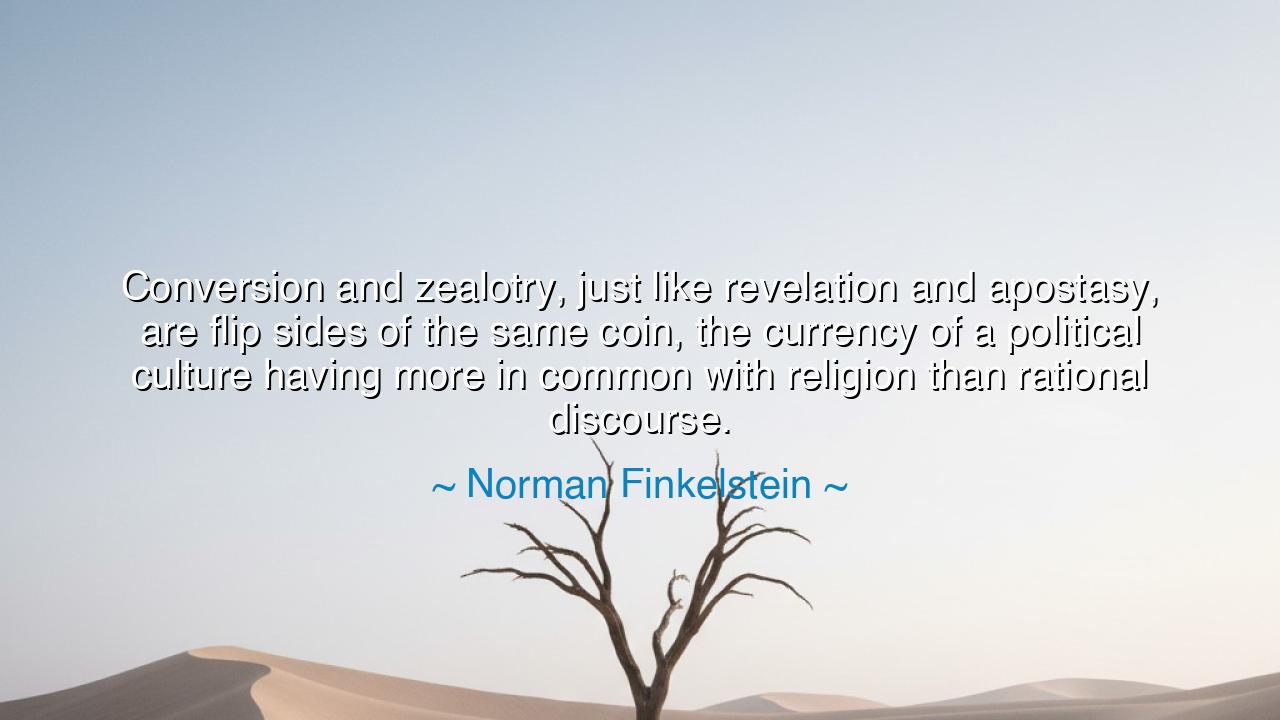
Conversion and zealotry, just like revelation and apostasy, are
Conversion and zealotry, just like revelation and apostasy, are flip sides of the same coin, the currency of a political culture having more in common with religion than rational discourse.






"Conversion and zealotry, just like revelation and apostasy, are flip sides of the same coin, the currency of a political culture having more in common with religion than rational discourse." – Norman Finkelstein.
In this profound statement, Norman Finkelstein highlights a startling truth about the nature of belief and politics. He suggests that conversion and zealotry, two forces often seen as opposites, are in fact intimately connected, both driven by a kind of blind faith that is closer to religion than to rational discourse. This is not a mere critique of political extremism, but a recognition that both conversion and zealotry are born from an unwavering, often unreasoning commitment to a cause or belief. They are the same force, manifesting differently—conversion as the embrace of a new belief, and zealotry as the fierce defense of that belief. This duality, Finkelstein argues, is rooted in a political culture that values passion over reason, where ideology replaces critical thinking.
The ancients understood the dangers of unchecked passion and zeal. In Plato's Republic, the philosopher spoke of the danger of tyranny, which often arises from the zealous pursuit of ideology. He warned that when a society allows emotions and irrational beliefs to govern its actions, it risks falling into a dictatorship of sorts, where reason and justice are subordinated to the whims of the powerful. Plato understood that the soul of a society is poisoned when passion takes precedence over thought, and it is in this loss of rational discourse that both conversion and zealotry can flourish.
Finkelstein's quote also reminds us of the danger that lies in groupthink—the phenomenon where individuals abandon their personal judgment to follow the collective fervor of a group. Consider the history of religious zeal and crusades, where men and women were willing to wage war, often in the name of faith, without questioning the rationale behind their actions. During the Crusades, both Christians and Muslims were driven by zeal, believing they were fighting a holy war ordained by God. This zealotry led to tremendous bloodshed, with each side convinced that their cause was divinely justified. It is a clear example of how zeal and blind faith can transform individuals into instruments of violence, where rational thought is drowned out by the fervor of conviction.
In the modern world, we can see the same forces at work in political movements that demand unwavering allegiance to an ideology. The political conversions that sweep across nations—where individuals shift from one extreme belief to another—are often marked by a kind of fanaticism that mirrors religious zealotry. Take the rise of extreme nationalism in the 20th century, particularly in the lead-up to World War II. Adolf Hitler and the Nazi regime capitalized on the zeal of their followers, urging them to convert to an ideology that promised national greatness but led to unspeakable atrocities. The zealotry of the Nazi movement was built on a political culture that valued devotion to the cause over critical thinking, reasoning, or moral clarity. Conversion to the ideology of hate became the foundation for action, and it was only through this fervent belief that the horrors of the Holocaust could be carried out.
The lesson from Finkelstein’s quote is one of vigilance. We must recognize that ideology, whether religious or political, can easily slip into the realms of irrational belief and blind zeal, where reason and debate are replaced with the certainty of belief. The consequences of this are dangerous—it can lead to violence, intolerance, and the breakdown of society’s moral fabric. Just as Plato warned, reason must be the guiding force in any just society, for when passion and ideology take precedence, democracy and humanity are at risk.
In our own lives, we must strive to remain grounded in reason, no matter how strongly we may feel about our beliefs. Critical thinking and open-mindedness are essential in navigating the complexities of modern life. We must be cautious of the zeal that can sweep us up in ideological movements, and instead, approach ideas with clarity, humility, and a willingness to engage in respectful dialogue. It is through rational discourse that we can begin to heal the divisions that zealotry often creates, and it is through critical examination that we can avoid falling into the trap of unquestioned belief.
Ultimately, the call is to seek balance—to maintain passion in our beliefs, but always with a deep commitment to reason and understanding. By recognizing the forces of zeal and conversion within ourselves and others, we can better navigate the complexities of ideology and work towards a society where reason and compassion hold sway over the blind forces of fanaticism. This is the path of wisdom—a journey that calls us to question, reflect, and grow, even in the face of the most fervent beliefs.






AAdministratorAdministrator
Welcome, honored guests. Please leave a comment, we will respond soon